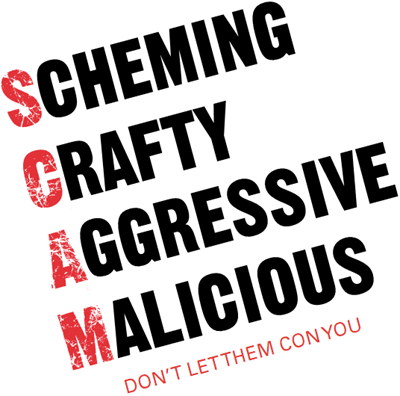5 Red Flags of a Scam
By Randell Tiongson on August 14th, 2015A few weeks ago I posted about scam warning. Between then and now, the SEC has issued no less than seven advisories urging people not to invest in other scams.
 At the risk of repeating myself, I’m not going to go into every single one of them to tell you why they’re scams. Instead, I’ll go over common the red flags that scream “SCAM!”. As always, if you’re offered an opportunity that seems too good to be true, it probably is; check against this list to make sure.
At the risk of repeating myself, I’m not going to go into every single one of them to tell you why they’re scams. Instead, I’ll go over common the red flags that scream “SCAM!”. As always, if you’re offered an opportunity that seems too good to be true, it probably is; check against this list to make sure.
- The company does not have license to offer and/or sell securities from the SEC.
Some scammers are getting smarter and registering their company to the SEC, which gives them the appearance of legitimacy. Here’s the thing – just because a corporation is registered with the SEC, it doesn’t mean they can take money from the public for investments.
SEC registration as an investment taker and SEC registration as a company are two different things. So if you ask them for SEC registration and they show you that they’re registered as a company, ask to see their registration that authorizes them to take investments. If they don’t show you anything, or they do show you something that looks completely fake, get out of there.
If you want to be extra sure, you can also do some research of your own by checking all the entities registered to take investments with the SEC here.
- You’re promised “no risk” and “high returns”.
According to the US SEC, “promises of high returns, with little or no risk, are classic warning signs of fraud.” For reference, as of last week, the top UITFs in the country gave just over 10% returns year-on-year (August 7, 2014 to August 7, 2015). One of the scams the Philippine SEC issued an advisory against promised 150% returns within 30 to 45 days. 150% in such a short time might sound really good, but the only guarantee there is that you’ll lose 100% of your money to a scam.
There’s no such thing as a free lunch, and there’s no such thing as a risk-free investment. I understand that it’s easy to be tempted by what seems to be a slam-dunk opportunity, but you have to keep both eyes open to avoid being scammed by unscrupulous individuals. Know the risks involved; if they keep saying there’s “no risk”, it’s most likely a scam.
- You don’t know what you’re investing in.
If you can’t name exactly what you’re putting your money in, it’s a huge red flag. Look at it this way; when you buy a mutual fund, you know you’re buying shares of an SEC-registered company. When you put P1,200 in Grandtime Automobile, for example, what are you putting your money in? Scammers deceive people by focusing on huge unrealistic gains instead of the “product” that you’re supposed to be selling. If, after talking to them, you still don’t know exactly what investment opportunity is, it’s a red flag.
Albert Einstein once said, “If you can’t explain it simply, you don’t understand it well enough.” And as I’ve always said, if you don’t understand something, don’t put your hard-earned money in it, because it’s likely that you’ll lose it.
- The focus is on recruitment, and not on the product.
Legitimate MLM schemes focus on selling a product to make money. Think Avon and Tupperware; these are MLM programs with tangible products. If what you’re being recruited to is more focused on recruiting others rather than actually selling a product, then it’s a red flag. Because in that scenario, what’s for sale is you. (And the people you’re supposed to recruit.)
If the focus is much more on recruitment (and there’s an entry fee), this can also explain why some people are getting paid. When someone says “It’s legit; look, I got my money already!”, it’s more than likely that the money came from entry fees from new recruits, according to the US SEC, instead of product sales. And when that’s the case, the drive to get new recruits is strong because that’s the only source of money for the scam. Check out the Direct Selling Association of of the Philippines for a list of legitimate multi-level marketing companies.
- There’s pressure to spend money right now.
It’s human nature to not want to miss out on anything. Scammers prey on this instinct by insisting that the opportunity they’re offering you is limited, and if you don’t buy in right now, you’ll never have the chance again.
Legitimate businesses will give you some time to think about whether you want to make an investment or not. Scams will insist you pay money now, and will try to blind you with outrageous promises just so they can get you to pay without thinking too hard about it. If you’re feeling pressure or being forced to buy or invest, it’s a red flag; make sure you have the time to step back and do your research before you make a decision.
Investing is one of the best ways to secure your financial future; however, you should always make sure that the opportunities you invest in are legitimate. Educating yourself on the different investment vehicles and their opportunities will ensure that you invest your money wisely.
If you think you’ve encountered a scam, report to the Enforcement and Investor Protection Department at (02) 584-6337 or call the police if it’s an emergency situation.


